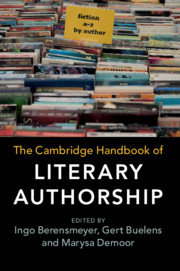Book contents
- The Cambridge Handbook of Literary Authorship
- The Cambridge Handbook of Literary Authorship
- Copyright page
- Contents
- Figures
- Contributors
- Acknowledgments
- Abbreviations
- Chapter 1 Introduction
- Part I Historical Perspectives
- Chapter 2 Authorship in Cuneiform Literature
- Chapter 3 Authorship in Ancient Egypt
- Chapter 4 Authorship in Archaic and Classical Greece
- Chapter 5 Authorship in Classical Rome
- Chapter 6 Conceptions of Authorship in Early Jewish Cultures
- Chapter 7 Modes of Authorship and the Making of Medieval English Literature
- Chapter 8 Manuscript and Print Cultures 1500–1700
- Chapter 9 The Eighteenth Century
- Chapter 10 The Nineteenth Century
- Chapter 11 Industrialized Print
- Chapter 12 Postmodernist Authorship
- Chapter 13 Chinese Authorship
- Chapter 14 Literary Authorship in the Digital Age
- Part II Systematic Perspectives
- Part III Practical Perspectives
- Select Bibliography
- Index
Chapter 13 - Chinese Authorship
from Part I - Historical Perspectives
Published online by Cambridge University Press: 07 June 2019
- The Cambridge Handbook of Literary Authorship
- The Cambridge Handbook of Literary Authorship
- Copyright page
- Contents
- Figures
- Contributors
- Acknowledgments
- Abbreviations
- Chapter 1 Introduction
- Part I Historical Perspectives
- Chapter 2 Authorship in Cuneiform Literature
- Chapter 3 Authorship in Ancient Egypt
- Chapter 4 Authorship in Archaic and Classical Greece
- Chapter 5 Authorship in Classical Rome
- Chapter 6 Conceptions of Authorship in Early Jewish Cultures
- Chapter 7 Modes of Authorship and the Making of Medieval English Literature
- Chapter 8 Manuscript and Print Cultures 1500–1700
- Chapter 9 The Eighteenth Century
- Chapter 10 The Nineteenth Century
- Chapter 11 Industrialized Print
- Chapter 12 Postmodernist Authorship
- Chapter 13 Chinese Authorship
- Chapter 14 Literary Authorship in the Digital Age
- Part II Systematic Perspectives
- Part III Practical Perspectives
- Select Bibliography
- Index
Summary
The modern Chinese term “zuo zhe” (author) is derived from the ancient word “zuo,” meaning to compose, to do, or to engage in – all commanding a notion of power and authority. These semantic threads collectively underpin the long-standing contention that Chinese authorship began with Confucius. Mencius (390–305 BCE) was the first person to claim that Confucius was the author of the Spring and Autumn Annals: “When the world declined and the Way fell into obscurity, heresies and violence again arose. […] Confucius was apprehensive and composed [zuo] the Spring and Autumn Annals.”1 The Han historian Sima Qian (c.145–c.86 BCE) inherited this concept of “zuo,” acknowledging that “when Confucius was in straits he wrote (zuo) the Spring and Autumn Annals.”2
- Type
- Chapter
- Information
- The Cambridge Handbook of Literary Authorship , pp. 201 - 217Publisher: Cambridge University PressPrint publication year: 2019



